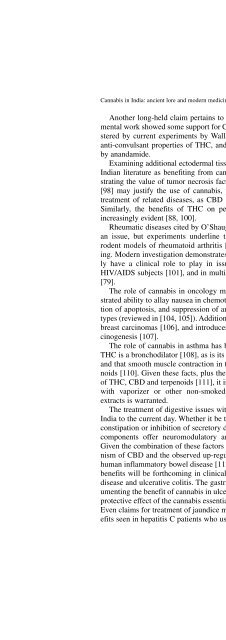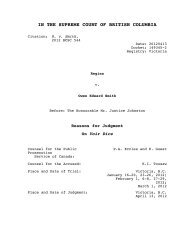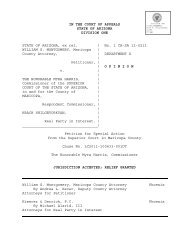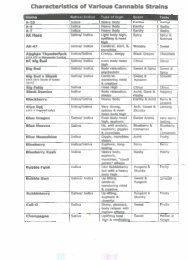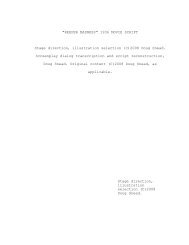3. Umbruch 4.4..2005 - Online Pot
3. Umbruch 4.4..2005 - Online Pot
3. Umbruch 4.4..2005 - Online Pot
You also want an ePaper? Increase the reach of your titles
YUMPU automatically turns print PDFs into web optimized ePapers that Google loves.
Cannabis in India: ancient lore and modern medicine 15<br />
Another long-held claim pertains to cannabis in epilepsy. Previous experimental<br />
work showed some support for CBD [95], but this has been greatly bolstered<br />
by current experiments by Wallace et al. [96, 97], demonstrating the<br />
anti-convulsant properties of THC, and the modulation of seizure thresholds<br />
by anandamide.<br />
Examining additional ectodermal tissue, both eczema and itch were cited in<br />
Indian literature as benefiting from cannabis treatment. Recent work demonstrating<br />
the value of tumor necrosis factor-α (TNF-α) antagonists in psoriasis<br />
[98] may justify the use of cannabis, particularly CBD-rich extracts, in the<br />
treatment of related diseases, as CBD shares this mechanism of action [99].<br />
Similarly, the benefits of THC on peripheral pain and itch are becoming<br />
increasingly evident [88, 100].<br />
Rheumatic diseases cited by O’Shaughnessy [36] and other authors remain<br />
an issue, but experiments underline the benefits of CBD in experimental<br />
rodent models of rheumatoid arthritis [99]. Phase II clinical trials are pending.<br />
Modern investigation demonstrates that cannabinoid treatments definitely<br />
have a clinical role to play in issues of appetite, with benefit seen in<br />
HIV/AIDS subjects [101], and in multiple sclerosis/neuropathic pain patients<br />
[79].<br />
The role of cannabis in oncology may now extend far beyond its demonstrated<br />
ability to allay nausea in chemotherapy [102, 103], but include promotion<br />
of apoptosis, and suppression of angiogenesis in a wide variety of tissue<br />
types (reviewed in [104, 105]). Additionally, THC has anti-prolactin activity in<br />
breast carcinomas [106], and introduces a metabolic block in pulmonary carcinogenesis<br />
[107].<br />
The role of cannabis in asthma has been much debated, but it is clear that<br />
THC is a bronchodilator [108], as is its terpenoid component, α-pinene [109],<br />
and that smooth muscle contraction in the lungs is mediated by endocannabinoids<br />
[110]. Given these facts, plus the prominent anti-inflammatory benefits<br />
of THC, CBD and terpenoids [111], it is apparent that additional investigation<br />
with vaporizer or other non-smoked inhalant technology with cannabis<br />
extracts is warranted.<br />
The treatment of digestive issues with cannabis has figured prominently in<br />
India to the current day. Whether it be through reduction of intestinal spasms,<br />
constipation or inhibition of secretory diarrhea processes in cholera, cannabis<br />
components offer neuromodulatory amelioration (reviewed in [88, 112]).<br />
Given the combination of these factors mediated by THC, the TNF-α antagonism<br />
of CBD and the observed up-regulation of endogenous cannabinoids in<br />
human inflammatory bowel disease [113], there is every reason to believe that<br />
benefits will be forthcoming in clinical trials of cannabis extracts in Crohn’s<br />
disease and ulcerative colitis. The gastritis claim finds support in studies documenting<br />
the benefit of cannabis in ulcer treatment [114], and the gastric cytoprotective<br />
effect of the cannabis essential-oil component, caryophyllene [115].<br />
Even claims for treatment of jaundice may find support in recent claimed benefits<br />
seen in hepatitis C patients who use cannabis [116].


